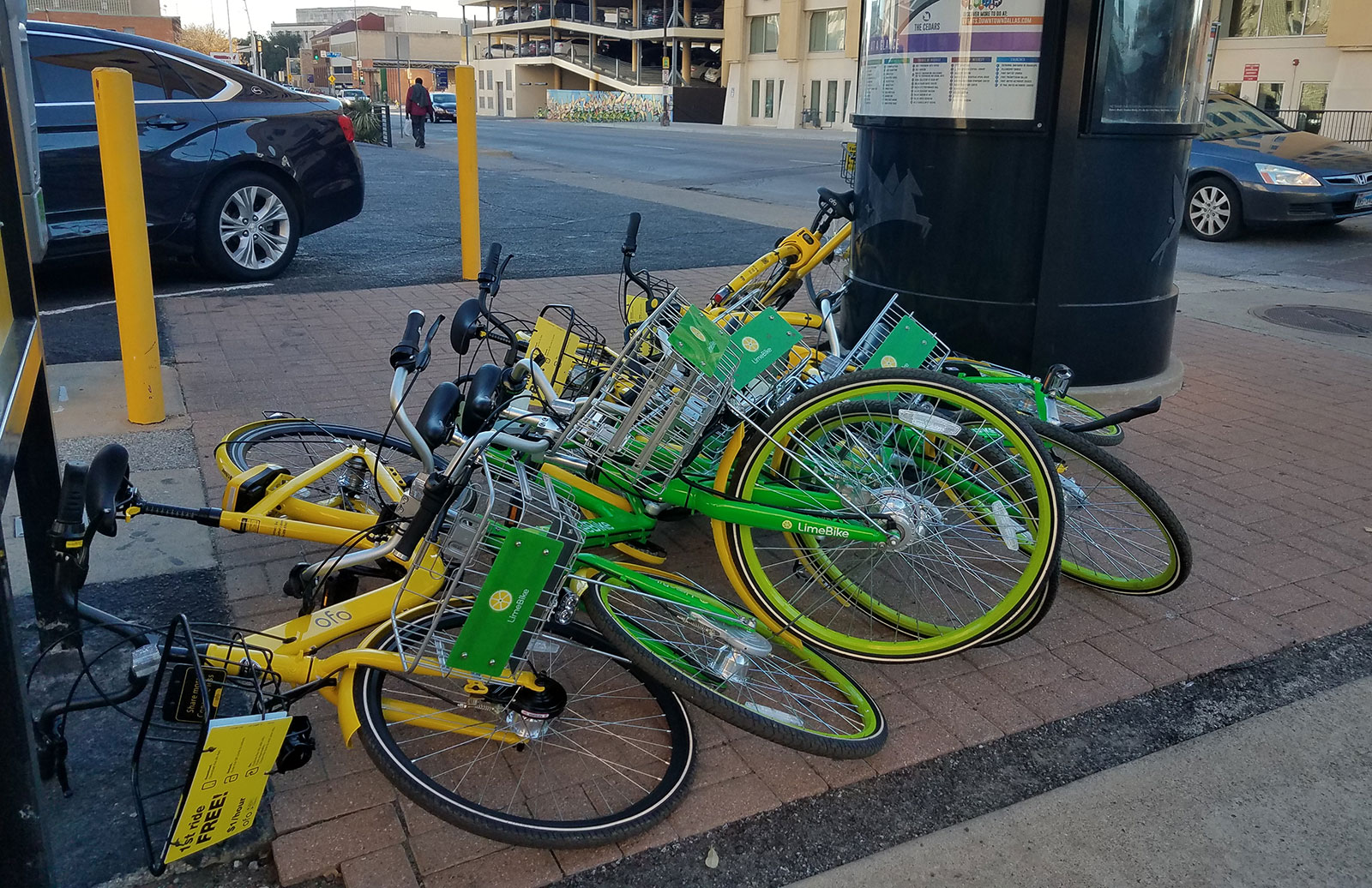At last count there are five — maybe 6 — bike share companies that have popped up around Dallas. The bikes are everywhere: lined up in rows along Davis St. in Oak Cliff; piled up in front of downtown street corners; stranded in front of office buildings or in flower beds outside churches; or tossed over fences in hard-to-reach locales. What began as an experiment in forward-thinking urbanism has evolved into an accidental study in urban manners and the ways Dallasites treat, use, and consider public space. As Slate reports, Dallas was the largest city without a bike share system. Now, “the arrival of several thousand bicycles operated by a handful of private companies has given it, overnight, one of the country’s largest fleets of shared bikes.”
Is Dallas’ bike share boom the reflection of a city that is finally open to rethinking its approach to mobility, or is it a manifestation of a market fad that has not proven itself? According to the Slate piece, the jury is still out. But an article in the Guardian about a bike shares in China is enough to inspire fear that Dallas’ bike share boom my just be a phase.
Here’s how it went down. Competing companies sensed an opportunity with the model that charged a small fee to rent a dock-less bike for a set amount of time. They flooded the streets of Chinese cities in hopes of ensuring that their bikes would be the most available and convenient for potential customers. At one point, Shanghai had 1.5 million rent-a-bikes on the streets. Sidewalks were clogged. Abandoned bikes piled up on street corners or were dumped in spots where they weren’t supposed to be. But China’s top firms still managed to raise lots of venture capital to out-pace their competitors.
China’s bike-sharing platforms attracted US$2 billion in funding over the last 18 months, making it one of the most popular industry investments for private equity, venture capitalists and angel investors. At the top of the heap are Mobike and Ofo, two Beijing-based companies each valued at more than US$1 billion, making them unicorns in a field with many smaller competitors.
But all was not going as well as it seemed. In November, Bluegogo, a bike share company that had 20 million users, making it the third largest bike share provider in China, suddenly went bankrupt.
In his letter [Bluegogo CEO] Li [Gang] said the company “looked like it was cursed since June”, with plenty of investors praising it but not a single commitment for new funding since June.
“Short of diversified capital backing and robust financial plans, even the best bike sharing business model would seem feeble,” he wrote, adding that the recent chill in the industry was to blame as it scared away Bluegogo investors, ruining any chance for a merger and acquisition deal.
With one of the largest bike share companies going belly up, the next question emerged: what to do with the millions of bikes that now had no use. According to Wired, in one city alone police rounded up 23,000 and hauled them off to 16 dump sites located around the city.
A photographer working for the Guardian captured the scene — new and expanding bicycle graveyards:
At first glance the photos vaguely resemble a painting. On closer inspection it might be a giant sculpture or some other art project. But in reality it is a mangled pile of bicycles covering an area roughly the size of a football pitch, and so high that cranes are needed to reach the top; cast-offs from the boom and bust of China’s bike sharing industry.
The photos must be seen. Is this where Dallas is heading, towards a future of rent-a-bike graveyards? Or will the share programs figure out how to navigate a investment-rich industry with unproven demand? When Slate asked David Levinson, a professor of transportation at the University of Sydney, whether the explosion of new bike share companies was a venture capital-funded bubble or a real evolution in the way we think about transportation, Levinson said, essentially, both.
“Yes,” he wrote back. “It’s like the internet in 1999.”
In other words, there may be a bubble, and it may pop. But bike shares are here to stay.





